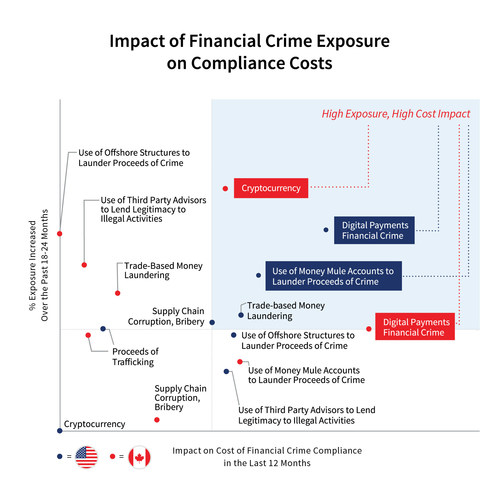Decision makers inside banks, investment firms, asset managers and insurance firms identify the drivers impacting financial crime compliance
LexisNexis Risk Solutions revealed the results of its annual True Cost of Financial Crime Compliance Study for the U.S. and Canada. The total projected cost of financial crime compliance for the region in 2021 is approximately $49.9 billion, up 19% from 2020 and up 58% compared to 2019. The new edition of the survey illustrates the sharp increase in financial crime compliance costs, compared with both the pre- and early pandemic timeframes. This rise is attributed in part to labor costs, increasing regulations and evolving criminal threats.
The study projects the average annual cost of financial crime compliance for U.S. financial institutions with $10 billion or more in assets to be $27.8 million for 2021, up 36% from last year and 95% since 2019, nearly doubling since the last study examining pre-pandemic times. Financial institutions of this size in Canada see a spend of $22.9 million, up 17% from last year and 64% since 2019.
Read More: Kyriba Unlocks Access to $15 Trillion Payment Network with Launch of Open API Platform

Pandemic Continues to Spur Growth
The pandemic continues to negatively impact compliance operations and the impact has significantly increased since the early stages of the pandemic.
- Sixty eight percent of U.S. respondents report longer times required to complete due diligence for new account onboarding due to the pandemic compared to 37% in 2020
- Fifty five percent of U.S. respondents report reduced productivity compared to 22% in 2020
Key Risk Sectors
More U.S. financial institutions now rank real estate and hospitality as top money laundering risk segments along with ecommerce. Real estate is favored by criminals who use shell companies to launder money through these types of transactions. Additionally, crime involving digital payments, trade-based money laundering and money mule schemes are on the rise with 83% of large U.S. financial institutions reporting an increase in exposure to crime involving digital payments.
Digital currency is a growing problem for Canadian firms with 75% reporting an increase in crime involving cryptocurrency. Crimes involving digital payments have the greatest impact on compliance costs for U.S. financial institutions whereas crimes involving cryptocurrency have the greatest impact on compliance costs for Canadian firms.
Operational Issues
The survey results demonstrate that financial institutions are battling a broader set of issues, with challenges reported across multiple areas including resource efficiencies and customer risk profiling. Higher labor costs were fueled by increased workload from growing compliance requirements with 74% of U.S. firms and 88% of Canadian firms listing expanding regulations as a primary driver for adding compliance staff. Survey respondents indicate that a lack of current and extensive data tops the list of Know Your Customer (KYC) due diligence challenges facing financial institutions, with lack of data about a business, complexity and broadness of business data and lack of up-to-date business information being cited most often by survey respondents.
“The study shows clear linkages between the pandemic, digital crime and increasing regulations. As a result, financial institutions need to prepare for expanded compliance obligations and risks from emerging financial crime,” said Leslie Bailey, vice president of financial crime compliance strategy for LexisNexis Risk Solutions.
Continued Bailey, “Digital transformation is a game-changer for financial crime compliance operations and will require a sophisticated approach that incorporates insight into digital behaviors and richer data to effectively mitigate risk and ensure compliance amidst growing regulatory pressures and evolving threats.”
Read More: LMN Pay Launches to Create Better Payment Processing System for Landscapers
[To share your insights with us, please write to sghosh@martechseries.com ]

